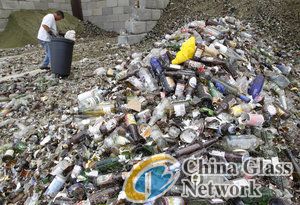Post Time:Aug 10,2011Classify:Industry NewsView:564
 Ripple Glass, Kansas City’s homegrown approach to recycling glass containers, has broken into new markets as far away as Lincoln, Neb., and Springfield, Mo.
Ripple Glass, Kansas City’s homegrown approach to recycling glass containers, has broken into new markets as far away as Lincoln, Neb., and Springfield, Mo.
Less than two years after its local launch, the private venture is now grinding thousands of tons of jars and bottles from a five-state area into a crushed glass product called cullet.
“We’re still alive and that’s exciting for us,” said Jeff Krum, an executive at Boulevard Brewing Co. and a co-founder of Ripple Glass. “It’s all about volume. The demand for cullet is close to limitless.”
So limitless the biggest challenge these days for Ripple Glass is getting more bottles and jars to crush. The company now has 80 purple collection bins around the Kansas City area for residential recycling, and is expanding its commercial program for bars and restaurants.
In January, Ripple Glass began collecting glass from about 70 bars and restaurants in the urban core of Kansas City, from the Missouri River to roughly 80th Street. It’s now preparing to expand into southern Johnson County.
“When we get 50 bars and restaurants committed, we’ll roll out the program there,” Krum said. “Our hope is to do the entire metro within 12 months.”
The ripple is spreading farther afield, too.
Krum said a dozen cities in five states, including Lincoln, Eureka Springs, Ark., Council Bluffs, Iowa, Jefferson City, Topeka and Springfield, have begun shipping their recyclable glass to Kansas City.
Springfield is sending 75 tons of recyclable glass a month to the Ripple Glass plant in Kansas City, said Barbara Lucks, interim sustainability officer for the city.
“This has been a real shot in the arm for the whole region,” she said. “We had very stubbornly hung on to our glass recycling program.”
Lucks said Springfield had been “paying through the nose” to transport its bottles and jars to recycling facilities in Oklahoma and St. Louis. With Ripple Glass, the city calls when it has collected about 25 tons, and Ripple Glass picks up the material at no charge.
“When I’m not charged anything, I can pass that savings along to outlying communities and get more of them involved,” she said.
Chris Zegar, president of Recycling Enterprises in Lincoln, said that city sent 200 to 250 tons of glass a month to Ripple Glass.
“We’ve always had glass recycling, but it’s been difficult at times because of shipping and freight costs,” he said. “It’s been a lot more feasible with Ripple Glass. It’s definitely helped with the flow of materials.”
Out of the 20,000 tons of glass expected to be recycled this year by Ripple Glass, about half will come from local residents through the purple bins, 45 percent from outside communities, and the rest from the pilot program with bars and restaurants.
Since the program started in November 2009, Krum estimated the percentage of potential recyclable glass collected in the Kansas City area had grown from 4 percent to 15 percent. The national average is 28 percent.
“In total, Kansas City generates about 80,000 tons of container glass waste each year, so you can see we still have a lot of room to grow locally, and still more regionally,” he said.
Ripple Glass was helped with an initial grant from the Mid-America Regional Council. Its private financing comes from Boulevard Brewing, developer Adam Jones, DST Systems and UMB Bank. It was intended to fill the void created when area curbside pickup of bottles and jars ended in 2003.
The new venture created a unique, self-contained metro system for glass recycling.
The glass containers are collected locally, processed and crushed at the Ripple Glass plant at 1642 Crystal Ave. Then the cullet is hauled to the Owens-Corning plant in Kansas City, Kan., where it’s melted and spun into fiberglass insulation.
Ripple Glass started with an initial investment of $4.5 million, but an additional $1.5 million had to be raised when more equipment was needed to sort the brown or amber glass being collected. The fiberglass plant could use cullet only if it contained less than 20 percent amber glass.
With more amber glass being collected in the form of beer and wine bottles, Ripple Glass needed another outlet for that cullet. A solution was found in Tulsa, the site of a beer-bottle manufacturing plant operated by Saint-Gobain.
“The neat thing is the amber glass we’re sorting goes to the company that makes Boulevard beer bottles,” Krum said. “We’re no longer a closed loop in the metro, but a continuous loop that can be regional indefinitely.”
The venture is breaking even when it comes to cash flow, but Ripple Glass still needs to increase the amount of glass it recycles by 30 to 40 percent before all the books are balanced when it comes to depreciation and equipment, Krum said.
With the new supplies coming from regional cities and local bars and restaurants, Krum is optimistic about the future of Ripple Glass.
“I’m feeling much better about our prospects for solvency and long-term sustainability,” he said.
Krum praised the continued support of the businesses and individuals who helped finance Ripple Glass, and emphasized the entire program would not have been possible without Deffenbaugh Industries.
Source: http://www.kansascity.comAuthor: shangyi
PrevSoladigm’s Dynamic Glass Exceeds NREL Durability Tests
Industry Veteran Jim Ventre Joins Gardner Glass ProductsNext